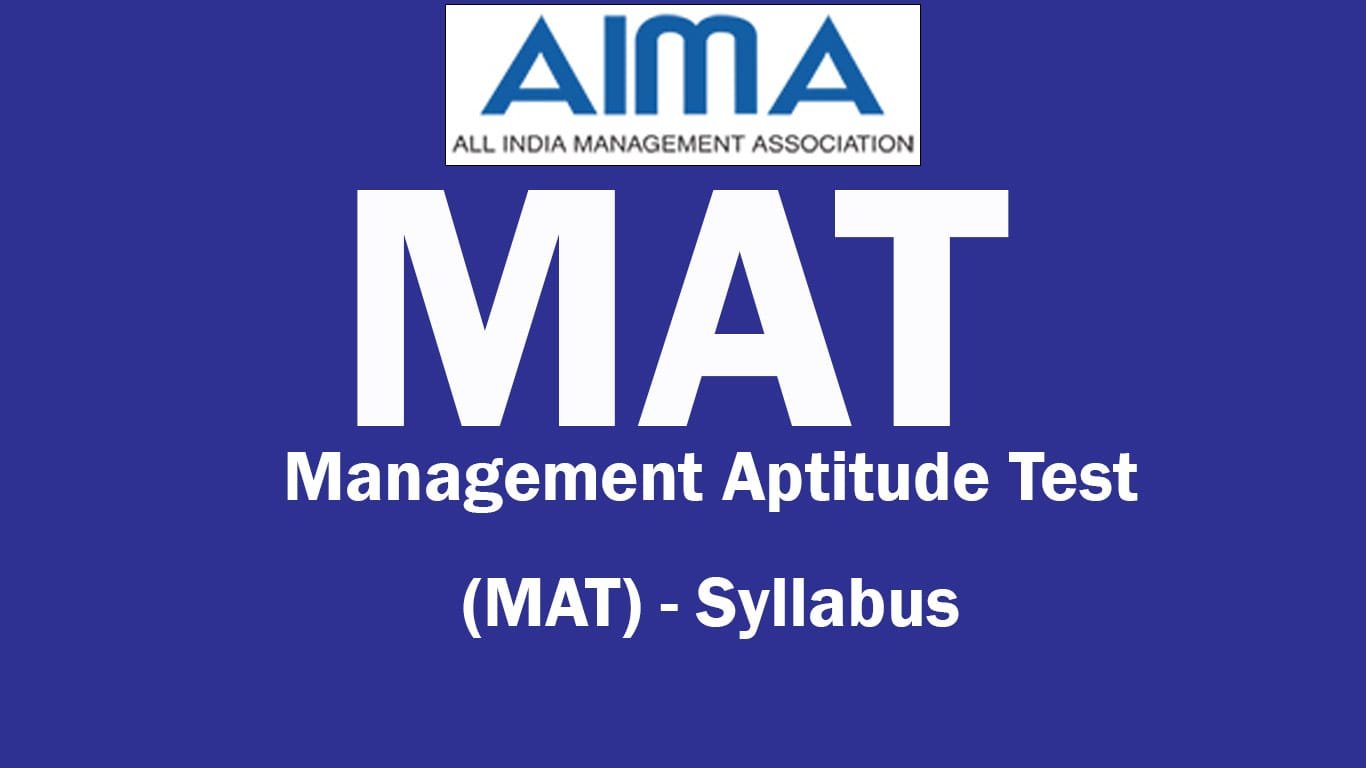MAT Syllabus 2025: Comprehensive Guide for MBA Aspirants
The Management Aptitude Test (MAT) is one of the most popular entrance exams for admission to MBA and other management programs in India. Conducted by the All India Management Association (AIMA), MAT assesses candidates’ analytical and problem-solving abilities, which are crucial for success in the business world. To prepare effectively for the exam, it is important to understand the MAT syllabus for 2025.
The MAT exam 2025 is conducted in three formats: Paper-Based Test (PBT), Computer-Based Test (CBT), and Remote Proctored Internet-Based Test (IBT). Despite the format, the core syllabus and structure remain consistent. The test evaluates a candidate’s proficiency in five main sections.
MAT 2025 Syllabus Overview
The MAT exam assesses skills across five sections:
- Language Comprehension
- Mathematical Skills
- Data Analysis and Sufficiency
- Intelligence and Critical Reasoning
- Indian and Global Environment (General Awareness)
Each of these sections contains 40 questions, with a total of 200 questions in the exam. The total duration for MAT is 2.5 hours (150 minutes). Each question is worth 1 mark, and there is a penalty of 0.25 marks for every incorrect answer.
Section-Wise MAT Syllabus for 2025
1. Language Comprehension
This section evaluates your proficiency in English and tests your ability to understand and analyze written material. You will be assessed on vocabulary, reading comprehension, and grammar.
Topics Covered:
- Reading Comprehension (RC)
- Sentence Correction
- Synonyms & Antonyms
- Fill in the Blanks
- Analogies
- Sentence Completion
- Grammar (Tenses, Articles, Prepositions, etc.)
- Critical Reasoning
Preparation Tips:
- Focus on reading diverse articles and books to enhance comprehension skills.
- Practice solving sentence correction and grammar-based questions.
- Work on building a strong vocabulary through daily reading.
2. Mathematical Skills
This section tests your quantitative aptitude and problem-solving ability. You will be required to solve problems related to basic mathematical concepts.
Topics Covered:
- Number System
- Algebra (Equations, Inequalities, Functions)
- Arithmetic (Percentages, Profit & Loss, Time & Work, Ratio & Proportion)
- Geometry (Lines, Angles, Circles, and Mensuration)
- Permutation and Combination
- Probability
- Time, Speed, and Distance
- Averages
Preparation Tips:
- Practice basic arithmetic and algebra problems.
- Focus on time management and shortcuts for solving problems quickly.
- Refer to previous year’s question papers to get an understanding of the difficulty level.
3. Data Analysis and Sufficiency
This section assesses your ability to interpret data presented in different formats such as graphs, tables, and charts. You will also need to answer questions based on data sufficiency.
Topics Covered:
- Bar Graphs, Line Graphs, Pie Charts, Tables
- Data Interpretation (DI) based on the above-mentioned graphs
- Data Sufficiency
- Caselets
- Ratio and Proportion
Preparation Tips:
- Practice interpreting various types of data from graphs and tables.
- Solve problems based on case studies to understand how to approach data sufficiency questions.
4. Intelligence and Critical Reasoning
This section measures your logical reasoning and decision-making abilities. It focuses on your capacity to analyze situations, identify patterns, and solve complex problems.
Topics Covered:
- Critical Reasoning (Arguments, Assumptions, Inferences)
- Verbal Reasoning (Strengthening and Weakening Arguments)
- Syllogisms
- Statements and Conclusions
- Logical Puzzles
- Blood Relations
- Coding-Decoding
- Directions and Distances
- Analogies and Classification
Preparation Tips:
- Solve puzzles and reasoning-based questions regularly.
- Enhance your ability to think logically by practicing with time constraints.
- Work on improving your analytical skills through mock tests.
5. Indian and Global Environment (General Awareness)
This section tests your knowledge of current affairs and general awareness about India and the world. It focuses on your understanding of the economic, political, social, and cultural aspects of India and the global landscape.
Topics Covered:
- Indian Economy (Current trends, Budget, etc.)
- Indian Politics
- International Affairs
- Business and Economy News
- Sports
- Awards and Recognitions
- Science and Technology Developments
- Environment and Ecology
Preparation Tips:
- Stay updated with current events by reading newspapers, magazines, and online news.
- Focus on key national and international events, government policies, and important figures.
- Revise facts related to the economy, geography, and environmental issues.
MAT Exam 2025: Key Points to Remember
- Total Number of Questions: 200 (40 questions from each of the 5 sections)
- Exam Duration: 150 minutes
- Marking Scheme: +1 for each correct answer, -0.25 for each incorrect answer
- Mode of Exam: PBT, CBT, IBT
Preparation Strategy for MAT 2025
- Study Plan: Create a daily schedule that allocates time for each section. Focus more on areas where you are weak but do not neglect the sections you’re already good at.
- Practice with Mock Tests: Take regular mock tests to familiarize yourself with the exam pattern and time constraints. Analyze your performance and identify areas for improvement.
- Review Previous Year Papers: Review past MAT papers to understand the types of questions asked and identify trends in the exam.
- Focus on Accuracy and Speed: MAT is a time-bound exam, so practice solving questions quickly and accurately.
- Stay Updated on Current Affairs: Read newspapers and magazines to keep abreast of current events, especially in areas like business, politics, and sports.
Conclusion
The MAT syllabus 2025 covers a wide range of topics that require thorough preparation. By following a structured study plan and practicing consistently, you can improve your chances of securing a high score and gaining admission to a prestigious MBA program. Make sure to focus on each section individually, while keeping track of your progress to ensure comprehensive preparation.










